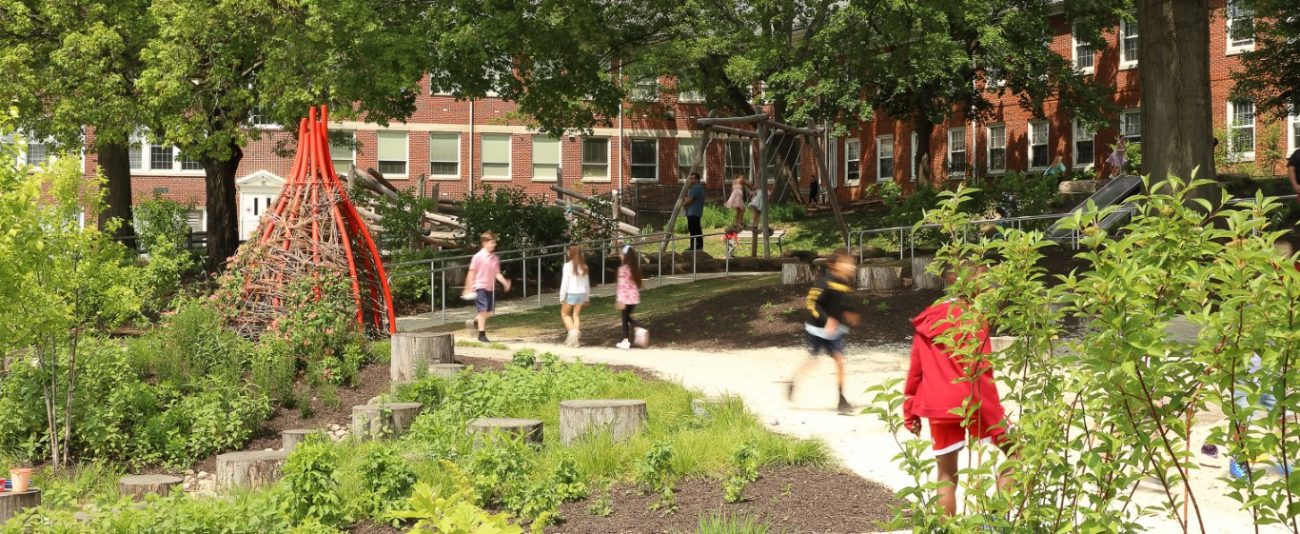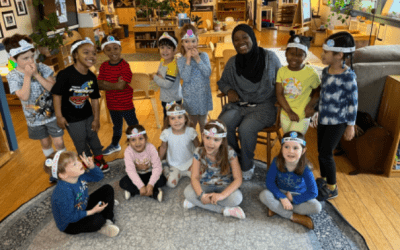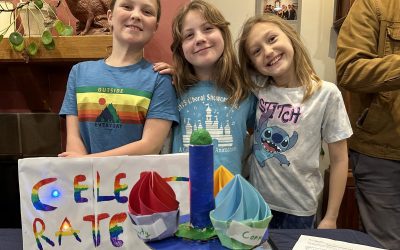Environmental Sustainability
As a Quaker school, Moorestown Friends advocates for the responsible stewardship of planet Earth and is committed to ensuring that all students understand the central role they play in conserving resources, living simply, and leading responsibly in an age of environmental degradation.
The process of becoming a more environmentally sustainable campus and school is on-going and guided by a Sustainability Action Plan that has been developed in partnership with Boyer Sudduth Environmental Consultants. Below you’ll read about campus projects and commitments, curriculum highlights, and community initiatives intended to maintain and strengthen our school’s commitment to environmental stewardship.
Environmental Stewardship at MFS
Learn about environmental sustainability from a student perspective…
Daniel Sorokin ’23 was one of the Co-Clerks of the Upper School Environmental Committee during the 2022-23 school year.
Daniel became passionate about beekeeping and by the end of his MFS career he was teaching a minor course on the subject!
 CAMPUS
CAMPUS
Moorestown Friends School is continually working to reduce the school’s carbon footprint. Our operations and maintenance staff work with this goal in mind on a daily basis. In recent years, numerous projects, enhancements, and upgrades have taken place to reduce the campus’s impact on the natural world. Some highlights:
- Hartman Hall, opened in 2012, is a LEED-certified building.
- The Playscape, opened in 2021, contains over 2,600 plants from 27 different species to encourage native pollinators (see summary below).
- LED lights are installed on the campus exterior and this transition is occurring gradually in classrooms, offices, and gymnasiums.
- Multiple rain gardens help to control stormwater runoff.
- A retention basin conserves water runoff to be recycled and used to irrigate athletic fields.
- Integrated Pest Management is practiced – an environmentally-sensitive approach to pest management that relies on a combination of common-sense practices while minimizing the use of pesticides.
- A geothermal well heats and cools Hartman Hall and Van Meter Hall.
- 100% green cleaning supplies are used by staff.
- Hot water heaters, air handlers are all high-efficiency.
- Compostable and recyclable materials are used in the Dining Hall.
- Water fountains provide filling stations and students, faculty, and staff are encouraged to use reusable water bottles to conserve water, and faculty and staff use reusable coffee and tea mugs/cups.
- A baseline energy assessment was conducted to begin efforts to reduce electric/energy usage.
CURRICULUM
Opportunities to learn what it means to be an environmental steward extend to students of all ages in many different ways throughout the school year. Some examples:
STUDENT/COMMUNITY INITIATIVES
A vibrant and robust array of volunteer groups are active on campus to help support and bolster the school’s environmental sustainability efforts.
Faculty/Staff Environmental Stewardship Committee (ESC)
The ESC has been a catalyst in sponsoring events, launching campaigns, and initiating educational efforts to help make MFS a more sustainable community and campus.
- “Water Wednesdays” promote using reusable water bottles. The committee held a sticker design competition for students to help raise visibility for this initiative and the stickers were produced and made available to the student body for their water bottles.
- The committee continues to actively work to encourage better recycling practices and sustainable options for cleaning chemicals, paper goods, takeout food packaging, and more on campus.
- Bins throughout campus encourage the use and collection of dirty reusable dishware.
- Low-waste lunches are encouraged and promoted through a “Trashless Tuesday” campaign in the Lower School.
- An E-Waste Collection took place in 2022 with hopes to host another in the near future.
- Old mascara wands were collected to be reused to brush and clean animals.
- The ESC annually hosts and promotes various Earth Month activities.
Since the ESC was established, two student groups have been established:
Upper School Environmental Committee
This committee was formally established in 2022 as a part of the Upper School Meeting for Worship for Business (student government). Committee members periodically collaborate and brainstorm with similar student groups at fellow independent schools such as Friends Select, Germantown Friends, and Penn Charter.
- A keystone event for this committee is Lower School Environmental Day when Upper School student volunteers lead Lower School students through a fun and wide-ranging half-day of activities, all geared toward educating students about environmentally sustainable practices.
- Committee members, in partnership with the MFS Science Department, maintain an active beehive and harvest honey.
Middle School Environmental Club
The club meets periodically to discuss campus and broader environmental issues. The club hosted a pop-up sale at lunch that brought visibility to environmental stewardship. The sale featured air plants, buttons, water bottle stickers, and hot chocolate in reusable mugs to help bring visibility to the importance of environmental stewardship. The group has also expressed interest in bolstering composting efforts around the school and offers feedback on more sustainable practice to be considered in the Dining Hall.
THE MFS PLAYSCAPE – OUTDOOR LEARNING, EXPLORATION, AND PLAY!
A shining example of the school’s commitment to environmental education is the new Playscape, opened in 2021. The outdoor area is referred to as a Playscape instead of a playground because it’s not just about play structures and activity. The space highlights the instructional value of landscape architecture and the desire for children to engage with and learn from nature.
Outdoor play is a natural extension of the learning that happens in our classrooms. As a Quaker institution, we support children to play collaboratively, resolve conflicts peacefully, and connect to the simplicity of nature while serving as environmental stewards. The Playscape is designed so children are surrounded by nature through every season, with colorful, ever-changing bushes, shrubs, and flowers of all shapes and sizes displaying berries, pods, and a variety of leaves throughout the year.
Click here to learn much more about the MFS Playscape.

SUSTAINABILITY NEWS
Eid al-Fitr and Ramadan Activities Recap
A number of activities took place on campus to educate students about Ramadan and Eid al-Fitr....
Director of College Counseling Leads Graduate Course at Villanova
Director of College Counseling Chris La Tempa led an online graduate course on Elite College Admission &...
Fourth Grade Students Display Empathy-Themed Designs for Families
Last Friday, fourth grade students hosted family members and fellow Lower School students to view their...


















